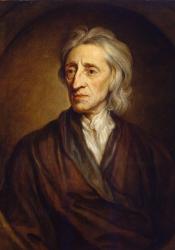John Locke's Influence on Writing About the Self (Historical) Chapter 2 (p.113)
John Locke, a seventeenth-century English philosopher, seems to have had a considerable influence on how Woolf communicated the complex fluidity of her character Orlando in the novel of the same name. Christy L. Burns writes in her essay "Re-Dressing Feminist Identities: Tensions between Essential and Constructed Selves in Virginia Woolf's Orlando" about what appears to be an allusion Woolf made to Locke's Essay Concerning Human Understanding. A connection between Locke's text can be made to the title of Orlando's poem "The Oak Tree" through the use of a metaphor picturing the chopping down of an oak tree. As a result, Locke's ideas concerning the idea of self and identity come into play in terms of the timeline of Orlando's creation and complicated main character's identity. Locke's main ideas concerning the self circulate around how the inner self will not be destroyed or altered by any sort of action inflicted upon the outer self: "the exterior's alteration... does not effect any change in the person's interior self" (Burns 348). This way of thinking directly connects back to Orlando's lengthy and personal poem while simultaneously expanding on the essence of what the poem is expressing about Orlando's identity in the midst of physical changes (male to female). Locke elaborates in his Essay on another way of thinking that uses similar language in terms of the discussion of clothing in Woolf's novel. Locke expresses that the essential self "will be the same self, as far as the same consciousness can extend to actions past or to come; and would be by distance of time, or change of substance, no more two persons, than a man be two men, by wearing other clothes to-day than he did yesterday, with a long or a short sleep between" (Locke 226). In other words, Locke is calling attention to the fact that what is placed on the exterior (clothing) or what the exterior physically does (sleep) does not cause inherently great changes in the inner self. But Orlando works to oppose what Locke is trying to say by being a person of great fluidity in terms of the inner and the outer self. Burns brilliantly connects Orlando's death-like periods of sleep and alternating male and female fashion choices to Locke's argument that the self is a fixed entity. It seems like Woolf was seeking to set Orlando up as an embodied argument against the popular philosophies of not only Locke, but other thinkers who had very fixed ideas on how the identity of the self was manifested. Woolf seeks to display, as Burn phrases it, that "'[f]abrication' can be unraveled as well as constructed" (349). Overall, Locke's ideas and influence as a philosopher and writer clearly influenced the interworkings of what the character of Orlando attempted to express about the complicated essence of the self as viewed through inner and outer perspectives, and thus plays an important role in the timeline of this particular novel.
Burns, Christy L. “Re-Dressing Feminist Identities: Tensions between Essential and Constructed Selves in Virginia Woolf's Orlando.” Twentieth Century Literature, vol. 40, no. 3, 1994, pp. 342–364. JSTOR, www.jstor.org/stable/441560. Accessed 25 May 2021.
Locke, John. An Essay Concerning Human Understanding. United Kingdom, T. Tegg and Son, 1836.

